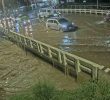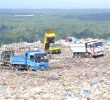DAVAO CITY – An official of the Aboitiz Power dismissed the fears of environmentalist on the harmful effects of the newly inaugurated coal fired power plant here saying they will not do anything bad for the city.
The 300 megawatts coal fired power plant was inaugurated yesterday in Barangay Binugao, Toril district. The event was graced by President Benigno Aquino III and other national and local officials.
The power plant currently supplies power to more than 20 electric cooperatives and distribution utilities in Mindanao.
Aboitiz Power CEO Erramon Aboitiz during the inauguration said they assure the public “that we will bring in the most modern facilities and would operate under the strictest environmental standards.”
“The days of highly polluting coal plants are a thing of the past and would definitely not be tolerated under Aboitiz power’s watch,” said Aboitiz.
“After all, the Aboitiz group has been an important part of davao and its growth for many decades. and we would not do anything that is not good for Davao,” Aboitiz said.
The power plant in Davao utilizes a circulating fluidized bed technology.
Environmental groups, however said coal-fired power plants “remain to be a clear and present threat for the city’s water resources due to the high risk of contamination from its toxic waste water by-products.”“All over the world, coal-burning power plants have been pointed out as one of the top polluting industries. In USA alone, it has been estimated that its coal power plants are responsible for the annual release of at least 5.5 billion pounds of pollution into their rivers and waterways. And despite this alarming fact, the Aquino government continues to implement policies which favor the coal industry,” said Interface Development Interventions executive director Ann Fuertes.
Fuertes pointed out that coal power plants produce toxic pollutants like lead, mercury, and arsenic.
She said that even with the current “clean coal” technologies, pollutants are merely moved from one waste stream to another but will still be eventually released into the environment.
“Whatever containment methods they will use, the probability of these pollutants escaping into the environment will still be high,” said Fuertes.
The group said the country’s reliance on coal “is a backward step” especially with the recently concluded United Nations Climate Change Conference (COP 21) in France.
Masipag Mindanao executive director Geonathan Barro called the move “counter-productive” adding it does not help mitigate the effects of climate change.
Barro pointed out that the coal emissions by coal power plants aggravate climate change patterns, causing unpredictable rainfalls and extreme weather conditions which are detrimental to farm productivity.
“We need to be focusing on sustainable climate mitigation measures which do not harm the environment. Rather than relying on unsustainable power sources, we should instead harness our renewable sources of energy which are very abundant in the country,” he said.
President Aquino admitted yesterday that the country could not wean completely from coal technology.
“After all, while I am a believer in developing renewables, at this point we are still hounded by the questions: what if there’s no wind? What if the clouds are overcast? And the solar efficiency is down? What if we do not have enough bio mass? Unfortunately, right now we cannot wean ourselves completely from relying on coal,” said Aquino.
The president also claimed the country has now increased the usage of renewable energy, which make up “33 percent of our energy mix”.
The environmental groups are now calling for stricter monitoring of the Therma South Incorporated plant’s operations.
IDIS advocacy coordinator Chinkie Pelink said copies of Therma South’s Environmental Impact Statement (EIS) and Environmental Compliance Certificate (ECC), along with the monitoring data should be made available to the public.
“We have to be even more vigilant in safeguarding our environment now that the coal plant is operational. The Multipartite Monitoring Team, which includes representatives from the local government agencies and from the Environmental Management Bureau (EMB), should strictly monitor its impact on air and water quality as well as the health of surrounding communities,” she added. (davaotoday.com)










